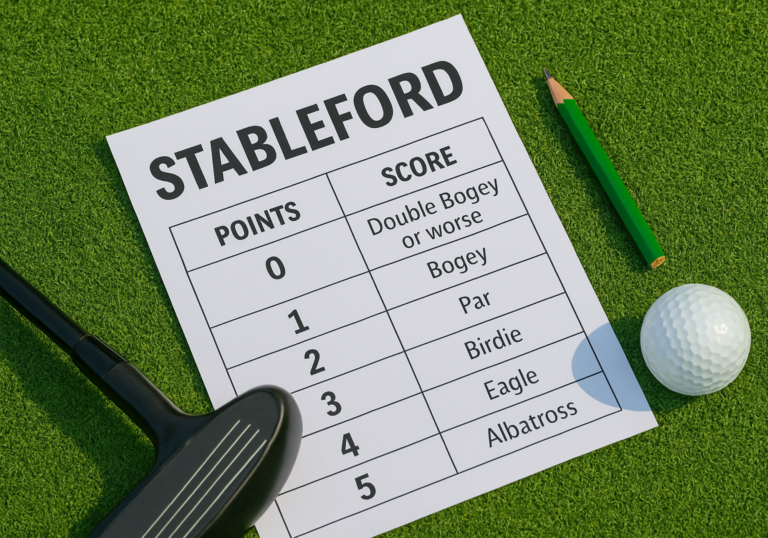If you’ve only ever played traditional stroke play, hearing someone say they’re using Stableford scoring might sound complicated. But here’s the good news—it’s not.
Stableford is one of the most straightforward and enjoyable scoring formats once you understand the basics. It rewards smart play, speeds up the game, and shifts the focus away from counting every stroke and toward earning points.
Here’s what Stableford scoring is, how it works, and why you might want to give it a try.
What Is Stableford Scoring?
Stableford is a point-based scoring system. Instead of counting your total strokes across 18 holes, you earn points based on how well you play each hole compared to par.
If you play a hole well, you earn more points. If you struggle on a hole, you earn fewer or no points. And here’s the best part: a single bad hole won’t ruin your round.
How Points Are Awarded
Most Stableford rounds use this traditional point structure:
- Double bogey or worse: 0 points
- Bogey: 1 point
- Par: 2 points
- Birdie: 3 points
- Eagle: 4 points
- Albatross (double eagle): 5 points
- Hole-in-one: 5 or more points depending on the format
Some versions of Stableford, especially in tournaments, use a modified version that increases the reward for birdies and eagles or even adds small penalties for bogeys and worse.
How Stableford Is Different from Stroke Play
In stroke play, every shot matters. One triple bogey can throw off your entire round.
In Stableford, once it’s clear you won’t earn points on a hole, you can simply pick up your ball and move on. The hole is scored as zero points, and you’re free to reset on the next tee.
This small change makes the round feel faster, lighter, and less punishing.
Stableford with Handicaps
Stableford becomes even more balanced when you apply handicaps. Here’s how it works:
If you are a 15-handicap player, you receive one stroke on the 15 most difficult holes. So if you make a bogey on one of those holes, it counts as a net par and earns 2 points instead of 1.
This adjustment levels the playing field and gives players of all skill levels a fair shot at winning or contributing in a group format.

Why You Should Try Stableford
It keeps the pace of play moving
Because you can pick up on a hole once you’re out of point range, there’s no pressure to grind out a 9 or 10. That saves time and frustration.
It’s easier to bounce back
A blow-up hole doesn’t wreck your round. You can make a double bogey, take your zero, and still chase birdies on the next hole.
It rewards aggressive play
You’re encouraged to take smart risks. Going for a birdie can gain you a full point or more. If it doesn’t work out, the damage is limited.
It works for all levels
With net scoring and handicaps, everyone has a chance to earn points. This makes it a perfect format for club events, mixed-skill groups, or social rounds.
It makes golf more fun
Stableford takes away the grind. Every hole is a fresh start and a new opportunity to earn points. It’s easier to stay positive and focused.
When to Use Stableford
Stableford works well in:
- Club competitions
- Friendly weekend rounds
- Group or league formats
- Mixed handicap events
- Charity tournaments
- Any round where pace and fun are a priority
It’s especially popular when you want to keep things casual and keep everyone engaged.
Final Thoughts
Stableford is a scoring system that takes the pressure off and puts the fun back in. It’s quick to learn, easy to play, and great for players who don’t want one bad hole to define their day.
So if you’re tired of grinding through every single shot or watching your score balloon after a bad hole, give Stableford a try. You might find it’s exactly the kind of golf you enjoy most.
Want to give Stableford a shot?
Next time you’re out with your regular group or planning a weekend game, suggest trying Stableford. Print a quick points guide, agree on handicap adjustments and keep track with a simple scorecard. You might be surprised how much more relaxed and enjoyable the round feels. Let us know how it goes, or share your Stableford tips and stories—we’re always game for hearing how others play.
